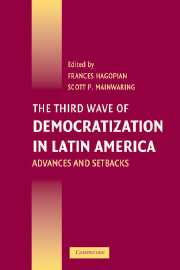Book contents
- Frontmatter
- Contents
- List of Figures
- List of Tables
- List of contributors
- Acknowledgments
- Introduction: The Third Wave of Democratization in Latin America
- 1 Latin American Democratization since 1978: Democratic Transitions, Breakdowns, and Erosions
- PART I THREE DEMOCRATIC GIANTS WITH AUTHORITARIAN PASTS: ARGENTINA, BRAZIL, AND MEXICO
- PART II UNEXPECTED DEMOCRACIES IN UNLIKELY COUNTRIES: BOLIVIA, EL SALVADOR, AND GUATEMALA
- PART III DEMOCRATIC EROSIONS IN THE THIRD WAVE: COLOMBIA, PERU, AND VENEZUELA
- 8 From “Restricted” to “Besieged”: The Changing Nature of the Limits to Democracy in Colombia
- 9 Peru 1980–2000: Chronicle of a Death Foretold? Determinism, Political Decisions, and Open Outcomes
- 10 Explaining Democratic Deterioration in Venezuela through Nested Inference
- PART IV Conclusions
- References
- Index
8 - From “Restricted” to “Besieged”: The Changing Nature of the Limits to Democracy in Colombia
Published online by Cambridge University Press: 05 September 2012
- Frontmatter
- Contents
- List of Figures
- List of Tables
- List of contributors
- Acknowledgments
- Introduction: The Third Wave of Democratization in Latin America
- 1 Latin American Democratization since 1978: Democratic Transitions, Breakdowns, and Erosions
- PART I THREE DEMOCRATIC GIANTS WITH AUTHORITARIAN PASTS: ARGENTINA, BRAZIL, AND MEXICO
- PART II UNEXPECTED DEMOCRACIES IN UNLIKELY COUNTRIES: BOLIVIA, EL SALVADOR, AND GUATEMALA
- PART III DEMOCRATIC EROSIONS IN THE THIRD WAVE: COLOMBIA, PERU, AND VENEZUELA
- 8 From “Restricted” to “Besieged”: The Changing Nature of the Limits to Democracy in Colombia
- 9 Peru 1980–2000: Chronicle of a Death Foretold? Determinism, Political Decisions, and Open Outcomes
- 10 Explaining Democratic Deterioration in Venezuela through Nested Inference
- PART IV Conclusions
- References
- Index
Summary
Colombia's democracy has always been a democracy with adjectives. Recently, references to its “controlled” or “restricted” nature have been replaced in the literature with descriptions of this democracy as “besieged” (Archer 1995) or “under assault” (Kline 1995). The shift in semantics is revealing. In this chapter, we argue that democracy in Colombia is still limited by a series of characteristics that merit the continued use of adjectives. Nevertheless, given that these limits have changed in nature, any adjectives used to characterize the current political regime in that country must be fundamentally different from those employed during the three decades spanning 1958 to 1991.
As Collier and Levitsky have pointed out (1997: 432), a good description is indispensable to evaluating the origins and consequences of any political regime. We have adopted the term “besieged” to describe the current state of democracy in Colombia. While previous adjectives emphasized internal or endogenous limits on the political regime, this definition highlights exogenous factors – that is, external forces that make it difficult for democracy to function adequately. During the National Front period, democracy's limitations resulted from restrictions on political participation and political competition. In the present era, its limitations are rooted in the impact of various forces on democracy: the erosion of the state, the expansion of violence, and the rise of powerful extrainstitutional actors who constrain the space needed to consolidate a free democratic playing field.
- Type
- Chapter
- Information
- The Third Wave of Democratization in Latin AmericaAdvances and Setbacks, pp. 235 - 260Publisher: Cambridge University PressPrint publication year: 2005
- 18
- Cited by



